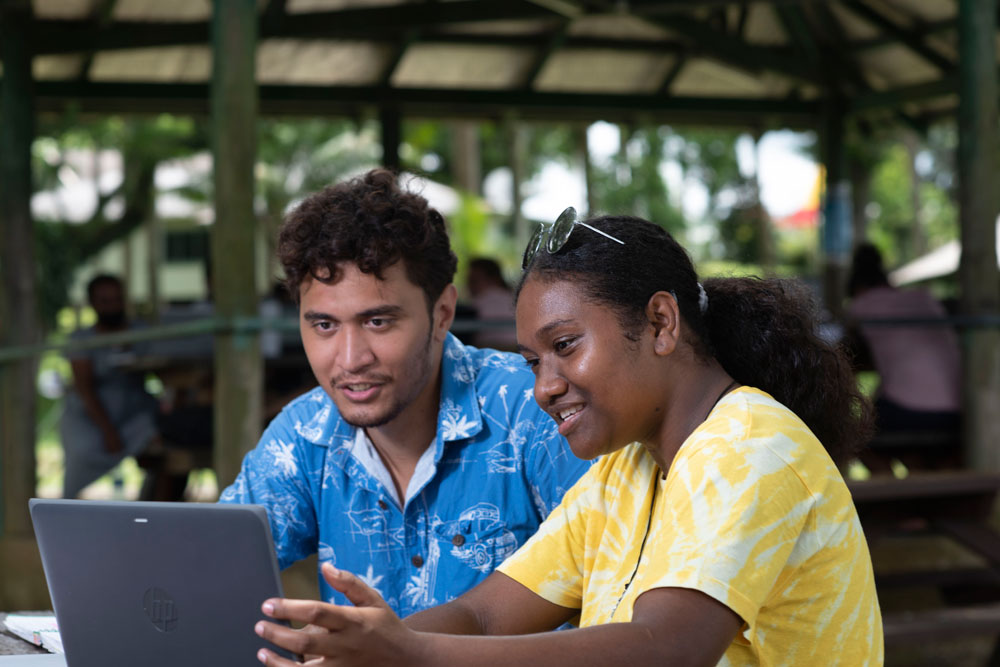Related News

The University of the South Pacific (USP) has established itself as a university that is adaptable, flexible, and focused on satisfying its students’ learning outcomes.
While Fiji and the rest of the world were dealing with the COVID-19 pandemic, USP demonstrated its true capabilities by being ranked for the first time in the Times Higher Education (THE) World University Rankings 2022 and as the 11th best university in the world in the area of Crisis Management by the World’s Universities with Real Impact (WURI) 2021 global ranking.
Fortunately, because of USP’s time-tested experience in distance learning and teaching since 1970 and online learning since 2000, the University was able to entirely convert to online mode in a short amount of time while meeting the required minimum standard of online education and teaching delivery. The University implemented several essential initiatives to guarantee that students continued to get high-quality education despite the effects of the pandemic.
The Centre for Flexible Learning (CFL) at USP is solely committed to the development of online courses. CFL became involved in facilitating connections between teaching personnel and students as well as tracking daily student participation levels. Face-to-face conversations, such as mentorship sessions and lab activities, were replaced by virtual tutorials and lab sessions, and a series of online workshops were held to assist with online learning. Other University departments, such as the Library, the Disability Resource Centre, and the Counselling Centre, continued to provide their services.
To further support students, all Schools, including Pacific TAFE, distributed key course materials via social media, the USP website, Tukutuku mail, and the media. Course Coordinators spent extra time answering students’ questions, whether by live chat, phone call, or email. While the University was optimistic that staff and students would fully adapt to remote teaching, it was also aware of pupils who might find online learning challenging to adapt to. The grading system was altered to provide for greater flexibility to address this. When students resumed face-to-face classes in late 2020, the grading system was restored to its prior state.
The Learning and Teaching (L&T) Continuity Team, led by Acting Deputy Vice-Chancellor Education (ADVCE) Professor Jito Vanualailai, monitored and reported on the weekly online engagement of students and staff and intervened as needed. The team also aimed to improve student participation and the quality of USP’s distant studies.
Professor Vanualailai remarked that the University had adjusted successfully to the COVID-19 environment, “mostly due to the hard work of USP’s highly competent academic and support staff.”
He went on to say that, in the future, the University plans to expand its distance education offerings, such as the increased use of Massive Open Online Courses (MOOCs) and live, interactive online courses, including increased innovations in educational technologies, such as the enhancement of USP’s Learning Management System and the adoption of learning analytics tools.
While there were numerous successes with remote teaching and learning, Professor Vanualailai emphasised three key challenges. The first was inaccessibility to campus facilities; the second was a lack of laptops or PCs, and the third was a lack of internet connectivity.
In response to these challenges, Professor Vanualailai stated the University implemented initiatives such as the toll-free USP Call Centre, Offline Print Packs (OPP), free access to USP learning platforms via Vodafone Fiji and Digicel Fiji, a laptop scheme offering subsidised laptops via the USP Book Centre, the provision of 700 laptops, and broadcasting course learning materials via Radio Pasifik.
An OPP is a compact print version of the course that can be downloaded and printed. It includes supplemental content that can be used both online and offline.
Patricia Abbock, a ni-Vanuatu student pursuing a Master of Arts in Geography, said the OPP made online studies easier because she could study even when she did not have access to the internet.
“The various initiatives provided by USP have been extremely beneficial to me. The standard of studies offered by USP did not make me feel like we were affected by COVID-19,” she said.
Bhavika Bharti Singh, a final-year student pursuing a Bachelor of Commerce in Information Systems and Finance, found the OPP useful in revisions, exams, and online assessments during online learning.
“I utilised OPP as a way to keep track of supplementary notes during exam revisions and online assessments. I took notes in this OPP. They were also a tremendous source of learning during power outages,” Bhavika added.
Furthermore, the USP established Outreach Commons (OC), off-campus computing facilities, and information centres in three densely inhabited locations.
“The Davuilevu and the Walu Bay OC were both established in 2020. A third OC was established in Nadi in 2021. The OCs provided students with access to high-quality computing resources and information relevant to their studies,” Professor Vanualailai said.
The University conducted Course Experience Surveys before the end of Semester 1, 2020, to determine how students adjusted to their courses after transitioning to remote learning.
“The response rate was 27%, giving a representative sample of the student body. The high affirmative student ratings implied that coping (on the part of students) also depended on the quality of delivery (on the part of the lecturers). The survey was a means to determine how to support the academic sections deliver quality programmes and cope with the challenges of remote delivery,” he said.
“It is very important that every student feels being part of the USP family because remote learning can induce a sense of isolation.”
According to Professor Vanualailai, based on the current Fijian Government advisory, the third wave is not expected to have a negative impact on the delivery of the University’s services, and students will be allowed to return to the classroom in the first semester of 2022.
“With the kind of experience gained during the second wave, the University is fully prepared to ensure learning and teaching continues irrespective of the situation we are faced with,” he emphasised.